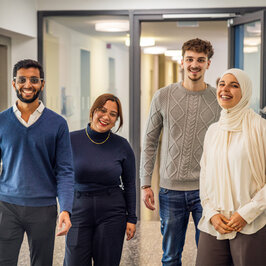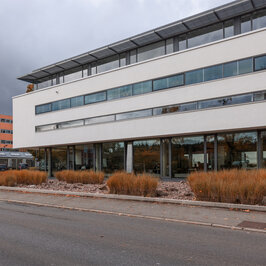Für Fragesteller und Ideenfinderinnen
Dieser Masterstudiengang richtet sich an Wirtschaftsabsolventinnen und -absolventen, die ihre Analyse- und Problemlösungsfähigkeiten weiterentwickeln möchten. Besonderes Augenmerk wird auf die zukünftigen Herausforderungen für Unternehmen und die Ziele des nachhaltigen Managements und Innovationsmanagements gelegt. Wenn du an neuesten Forschungergebnissen interessiert bist, die Managementpraxis hinterfragst und neue Ideen in einem sich wandelnden Geschäftsumfeld einbringen willst, bist du hier genau richtig!
Details zum Studiengang
Studieninhalte und Ablauf
IMM ist ein dreisemestriger Vollzeitstudiengang. Unsere Unterrichtsinhalte haben einen Fokus auf Zukunftstrends und Innovation. Wir entwickeln Kompetenzen für nachhaltiges, zukunftsfähiges Management.
In den ersten beiden Semestern beschäftigst du dich mit zukunftsorientierten, interdisziplinären Managementthemen und wirst neu gelernte Methoden im internationalen Projektteam anwenden. Im dritten Semester schreibst du deine Thesisarbeit - ggf. in Kooperation mit einem Unternehmen. Im thesisbegleitenden Kolloquium erlebst du einen intensiven Austausch mit deinen Kommilitoninnen und Kommilitonen und bekommst kontinuierliches Feedback zum aktuellen Stand deiner Arbeit.
Voraussetzungen
Für deine Bewerbung benötigst du:
- Einen Bachelor-Abschluss in einem wirtschaftsbezogenen Fach mit einem überdurchschnittlichen Notendurchschnitt
- Die Fähigkeit zum wissenschaftlichen Arbeiten, nachgewiesen durch eine Bachelorarbeit oder eine alternative wissenschaftliche Arbeit
- Beherrschung der englischen Sprache in Wort und Schrift, nachgewiesen durch ein vollständig englischsprachiges Studium, TOEFL (Ergebnis >95), IELTS (Ergebnis >7) oder einen gleichwertigen Test
Und das steckt drin
Studien- und Prüfungsordnungen IMM:
Besonderheiten
Das IMM Programm zeichnet sich aus durch:
- eine kleine Gruppengröße, eine familiäre Atmosphäre und individuellen Student Support
- die selbständige Arbeit in interkulturellen Projektteams an interdisziplinären Themen
- einen Fokus auf zukunftsfähige Problemlösungsfähigkeiten vor dem Hintergrund von Future Skills
- ein schlankes Curriculum mit zwei Unterrichtssemestern und einem Thesissemester
- Englisch als Unterrichtssprache
Studiengebühren und Lebenshaltungskosten
Semesterbeiträge
Ab dem Wintersemester 2023/2024 zahlen alle Studierenden der Hochschule Furtwangen zusätzlich zu den ggf. anfallenden Studiengebühren (siehe unten) pro Semester einen Beitrag in Höhe von 149 €.
Studiengebühren für Nicht-EU-Bürger
Im Jahr 2017 hat die baden-württembergische Landesregierung Studiengebühren in Höhe von 1.500 € pro Semester für Studierende aus Nicht-EU-Staaten eingeführt. Es gibt jedoch zahlreiche Ausnahmen von der Verpflichtung, dass Nicht-EU-Studierende Studiengebühren in Höhe von 1.500 € pro Semester zahlen müssen.
Lass dich am besten durch den International Student Support beraten!
Stipendien
Nationale und internationale Studierende können sich bei zahlreichen Organisationen für ein Stipendium bewerben.
Wirf doch mal einen Blick in die Externer Link wird in neuem Fenster geöffnet:Stipendiendatenbank des DAAD. Vielleicht ist da was für dich dabei.
Lebenshaltungskosten
Die Lebenshaltungskosten betragen durchschnittlich 934 € pro Monat und liegen in der alleinigen Verantwortung der Studierenden. Für das Studierendenvisum musst du nachweisen, dass du über finanzielle Mittel in dieser Höhe für den gesamten Zeitraum des Studiums verfügst. Bitte beachte, dass es sich dabei um eine Mindestanforderung handelt. Die tatsächlichen Lebenshaltungskosten können je nach Wahl der Unterkunft und Nutzung der örtlichen Einrichtungen höher sein. Eine finanzielle Unterstützung durch die Hochschule für die Lebenshaltungskosten ist nicht möglich.
Deine Karriereaussichten
Hochrangige Positionen warten auf dich
Als Absolventin oder Absolvent dieses Studiengangs verfügst du über die fortgeschrittenen Problemlösungskompetenzen, die für verschiedene Führungspositionen in der Industrie und im öffentlichen Sektor erforderlich sind. Damit stehen dir vielfältige Karrierewege offen!
Beispiele für deine Chancen als IMM Master:
- Managementpositionen sowohl in multinationalen, als auch in kleineren und mittleren Unternehmen - insbesondere in solchen, die auf internationalen Märkten tätig sind
- Positionen in allen Arten von Unternehmensberatungen
- Strategische Positionen in Industrieverbänden
- Unternehmensgründung
- Promotion
Erfahrungsberichte
Einblicke in das Campusleben
Neuigkeiten der Fakultät
Veranstaltungen und Events
Wir beraten dich gerne zum internationalen Masterstudium IMM!
Deine Ansprechpersonen





